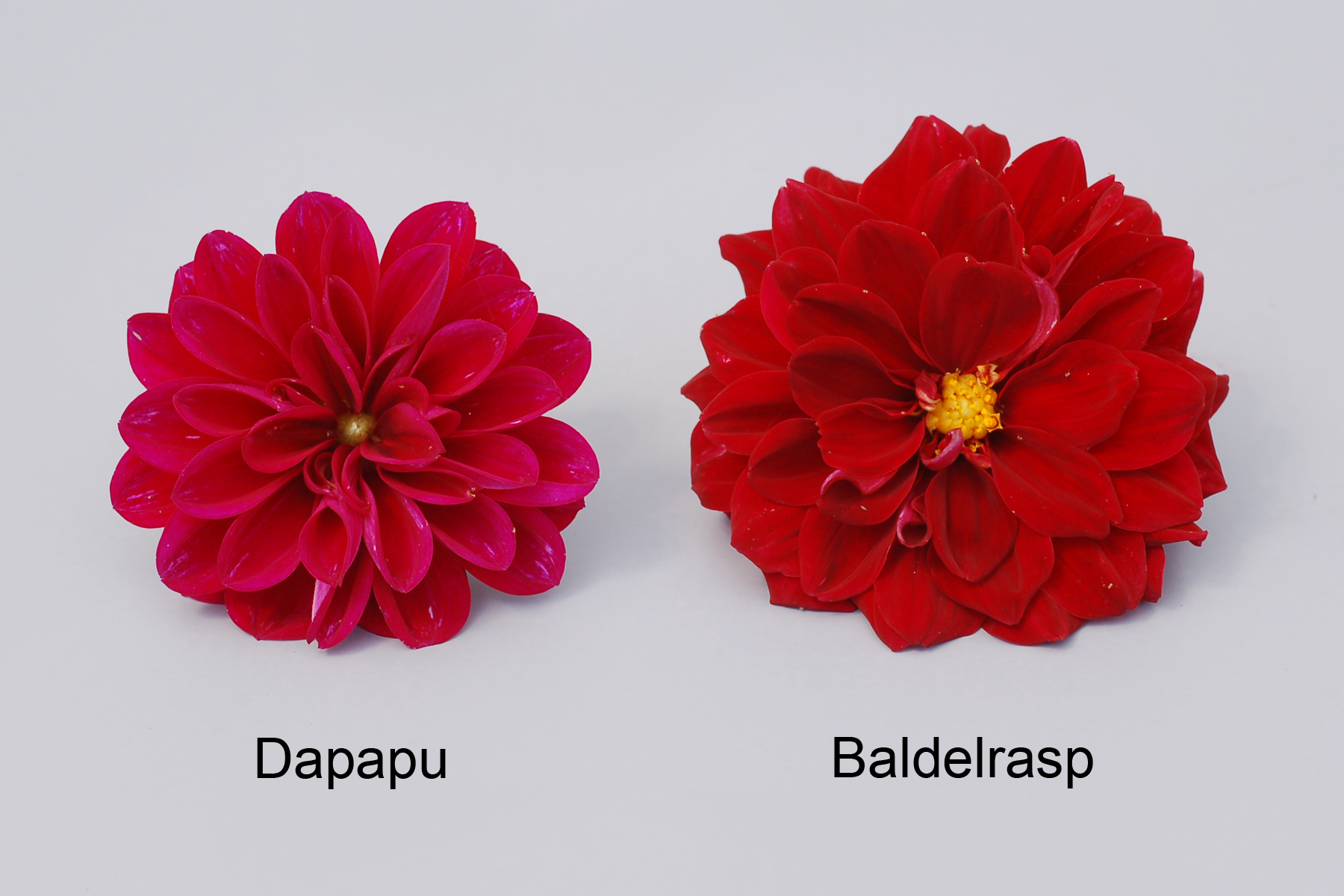Dapapu
| Denomination: | 'Dapapu' |
|---|---|
| Trade name: | Dahlietta Patty |
| Botanical Name: | Dahlia pinnata |
| Applicant/Holder: |
Ball Horticultural Company 622 Town Road West Chicago, Illinois 60185 United States of America |
| Breeder: |
Ball Horticultural Company, West Chicago, United States of America |
| Agent in Canada: |
BioFlora Inc. 38723 Fingal Line R.R. #1 St. Thomas, Ontario N5P 3S5 Canada Tel: 519-317-7511 |
| Application Date: | 2005-02-18 |
| Application Number: | 05-4586 |
| Grant of Rights Date: | 2008-12-18 |
| Certificate Number: | 3428 |
| Date rights surrendered: | 2010-12-17 |
Variety Description
Variety used for comparison: 'Baldelrasp' (Delicious Raspberry)
Summary: 'Dapapu' has a shorter plant and smaller flower head diameter than 'Baldelrasp'. The leaves of 'Dapapu' are simple type while those of 'Baldelrasp' are compound. The upper side of the ray florets of 'Dapapu' is lighter purple red than that of 'Baldelrasp' which is dark purple red with redder tones in the centre and at the base. The lower side of the ray florets of 'Dapapu' is purple with purple red tones and whitish veins while that of 'Baldelrasp' is dark purple red with purple red streaks.
Description:
PLANT: upright bushy growth habit
STEM: medium green, no anthocyanin colouration
LEAF: simple type, 2.3:1 length/width ratio, medium green on upper side, wings on petiole present, medium number of moderately deep incisions of margin, smooth to very weakly rugose texture on upper side, raised veins on upper side
FLOWER HEAD: no anthocyanin colouration of the peduncle, positioned at the same level to moderately above foliage, attitude relative to peduncle ranges from approximately right-angle to upright, double decorative type, one coloured, dark red purple colour group, moderate to dense ray florets
RAY FLORET: 1.6:1 length/width ratio, inner ray florets are slightly incurving along longitudinal axis, outer ray florets are mostly straight along longitudinal axis, cross-section at mid-point of inner ray florets is moderately folded inward in V-shape, cross-section at mid-point of outer ray florets is weakly convex in U-shape, lateral margins at middle are flat, emarginate and mamillate tip, even colour distribution, dark purple red on upper side, lower side is purple with purple red tones and whitish veins
DISC: small diameter in relation to flower head, yellow before anther dehiscence, yellow orange at anther dehiscence
Origin & Breeding History: 'Dapapu' was discovered on January 8, 2001 as a naturally occurring sport of 'Dapavio' (Dahlietta Caroline) at Rijsenhout, Noordholland, The Netherlands. It was selected for its purple flower colour and compact plant growth habit. Since its discovery, asexual propagation has been through the use of vegetative cuttings.
Tests & Trials: Trials for 'Dapapu' were conducted in a polyhouse during the summer of 2007 at BioFlora Inc. in St. Thomas, Ontario. The trial included 15 plants per variety. All plants were grown from rooted cuttings and transplanted into 15 cm pots on May 10, 2007. Observations and measurements were taken from 10 plants of each variety on July 27 and August 8, 2007. All colour determinations were made using the 2001 Royal Horticulture Society (RHS) Colour Chart.
Comparison tables for 'Dapapu' with reference variety 'Baldelrasp'
Plant height (cm)
| 'Dapapu' | 'Baldelrasp' | |
|---|---|---|
| mean | 19.4 | 27.1 |
| std. deviation | 1.06 | 1.30 |
Flower head diameter (cm)
| 'Dapapu' | 'Baldelrasp' | |
|---|---|---|
| mean | 6.0 | 7.8 |
| std. deviation | 0.51 | 0.58 |
Colour of ray floret (RHS)
| 'Dapapu' | 'Baldelrasp' | |
|---|---|---|
| upper side | 60A-B | 53A with 46B tones in centre and at base |
| lower side | 61B with N66B tones and whitish veins | darker than 46A with 60D streaks |
Click on image for larger view

Dahlia: 'Dapapu' (left) with reference variety 'Baldelrasp' (right)
- Date modified: